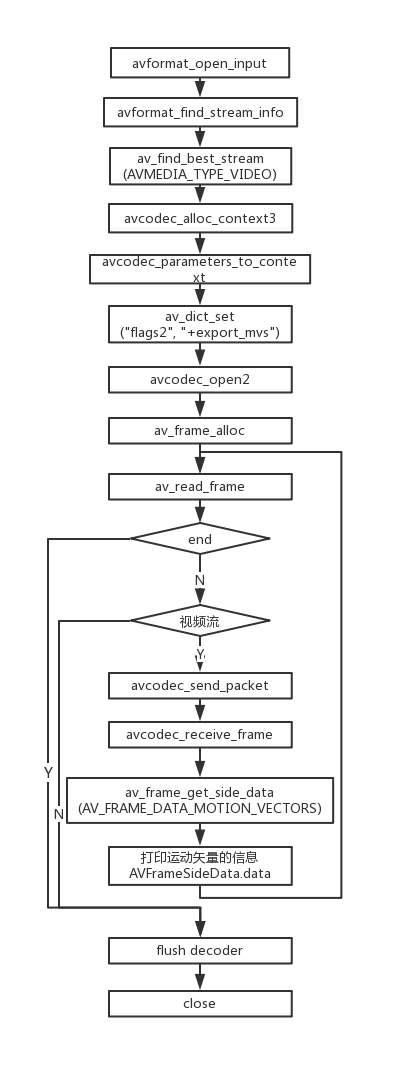我发现用FFmpeg提取运动矢量比HM提取更加方便好用!
- 参考
(1)https://blog.csdn.net/ricky90/article/details/79436422
(2)https://github.com/FFmpeg/FFmpeg/blob/release/4.1/doc/examples/extract_mvs.c
2.示例说明
示例来源于[1],程序的流程如下所示。

FFmpeg提供了获取编码的运动矢量的方法。
- 打开解码器的时候设置参数:av_dict_set(&opts, “flags2”, “+export_mvs”, 0)。
- 使用av_frame_get_side_data(frame, AV_FRAME_DATA_MOTION_VECTORS)来获取解码frame中的运动矢量。
av_frame_get_side_data返回的数据类型为AVFrameSideData*,AVFrameSideData定义在libavutil/frame.h,如下所示。
/**
* Structure to hold side data for an AVFrame.
*
* sizeof(AVFrameSideData) is not a part of the public ABI, so new fields may be added
* to the end with a minor bump.
*/
typedef struct AVFrameSideData {
enum AVFrameSideDataType type;
uint8_t *data;
int size;
AVDictionary *metadata;
AVBufferRef *buf;
} AVFrameSideData;
- AVFrameSideDataType:表示数据的类型,用来存储运动矢量数据时,AVFrameSideDataType 为AV_FRAME_DATA_MOTION_VECTORS。
- data:指向数据buffer的指针,AVFrameSideDataType 为AV_FRAME_DATA_MOTION_VECTORS,data指向的地址存储的是AVMotionVector类型的数据。
- size:data指向的数据buffer的大小。
AVMotionVector是表示运动矢量的数据结构,定义在libavutil/motion_vector.h,如下所示。
typedef struct AVMotionVector {
/**
* Where the current macroblock comes from; negative value when it comes
* from the past, positive value when it comes from the future.
* XXX: set exact relative ref frame reference instead of a +/- 1 "direction".
*/
int32_t source;
/**
* Width and height of the block.
*/
uint8_t w, h;
/**
* Absolute source position. Can be outside the frame area.
*/
int16_t src_x, src_y;
/**
* Absolute destination position. Can be outside the frame area.
*/
int16_t dst_x, dst_y;
/**
* Extra flag information.
* Currently unused.
*/
uint64_t flags;
/**
* Motion vector
* src_x = dst_x + motion_x / motion_scale
* src_y = dst_y + motion_y / motion_scale
*/
int32_t motion_x, motion_y;
uint16_t motion_scale;
} AVMotionVector;
参数说明:
- int32_t source:当前像素参考的帧来源,负值表示时参考过去的帧,正值表示参考未来的帧。
- uint8_t w, h:block的宽和高。
- int16_t src_x, src_y:源的绝对位置。可能在frame之外。
- int16_t dst_x, dst_y:目的的绝对位置。可能在frame之外。
- uint16_t motion_scale:运动矢量的像素精度,4则表示1/4像素。
- int32_t motion_x, motion_y: 运动的矢量。满足下面的等式。
src_x = dst_x + motion_x / motion_scale
src_y = dst_y + motion_y / motion_scale
- 示例代码
/*
* Copyright (c) 2012 Stefano Sabatini
* Copyright (c) 2014 Clément Bœsch
*
* Permission is hereby granted, free of charge, to any person obtaining a copy
* of this software and associated documentation files (the "Software"), to deal
* in the Software without restriction, including without limitation the rights
* to use, copy, modify, merge, publish, distribute, sublicense, and/or sell
* copies of the Software, and to permit persons to whom the Software is
* furnished to do so, subject to the following conditions:
*
* The above copyright notice and this permission notice shall be included in
* all copies or substantial portions of the Software.
*
* THE SOFTWARE IS PROVIDED "AS IS", WITHOUT WARRANTY OF ANY KIND, EXPRESS OR
* IMPLIED, INCLUDING BUT NOT LIMITED TO THE WARRANTIES OF MERCHANTABILITY,
* FITNESS FOR A PARTICULAR PURPOSE AND NONINFRINGEMENT. IN NO EVENT SHALL
* THE AUTHORS OR COPYRIGHT HOLDERS BE LIABLE FOR ANY CLAIM, DAMAGES OR OTHER
* LIABILITY, WHETHER IN AN ACTION OF CONTRACT, TORT OR OTHERWISE, ARISING FROM,
* OUT OF OR IN CONNECTION WITH THE SOFTWARE OR THE USE OR OTHER DEALINGS IN
* THE SOFTWARE.
*/
#include <libavutil/motion_vector.h>
#include <libavformat/avformat.h>
static AVFormatContext *fmt_ctx = NULL;
static AVCodecContext *video_dec_ctx = NULL;
static AVStream *video_stream = NULL;
static const char *src_filename = NULL;
static int video_stream_idx = -1;
static AVFrame *frame = NULL;
static int video_frame_count = 0;
static int decode_packet(const AVPacket *pkt)
{
int ret = avcodec_send_packet(video_dec_ctx, pkt);
if (ret < 0) {
fprintf(stderr, "Error while sending a packet to the decoder: %s\n", av_err2str(ret));
return ret;
}
while (ret >= 0) {
ret = avcodec_receive_frame(video_dec_ctx, frame);
if (ret == AVERROR(EAGAIN) || ret == AVERROR_EOF) {
break;
} else if (ret < 0) {
fprintf(stderr, "Error while receiving a frame from the decoder: %s\n", av_err2str(ret));
return ret;
}
if (ret >= 0) {
int i;
AVFrameSideData *sd;
video_frame_count++;
sd = av_frame_get_side_data(frame, AV_FRAME_DATA_MOTION_VECTORS);
if (sd) {
const AVMotionVector *mvs = (const AVMotionVector *)sd->data;
for (i = 0; i < sd->size / sizeof(*mvs); i++) {
const AVMotionVector *mv = &mvs[i];
printf("%d,%2d,%2d,%2d,%4d,%4d,%4d,%4d,%d,0x%"PRIx64"\n",
video_frame_count, mv->source,
mv->w, mv->h, mv->src_x, mv->src_y,
mv->dst_x, mv->dst_y, mv->motion_scale, mv->flags);
}
}
av_frame_unref(frame);
}
}
return 0;
}
static int open_codec_context(AVFormatContext *fmt_ctx, enum AVMediaType type)
{
int ret;
AVStream *st;
AVCodecContext *dec_ctx = NULL;
AVCodec *dec = NULL;
AVDictionary *opts = NULL;
ret = av_find_best_stream(fmt_ctx, type, -1, -1, &dec, 0);
if (ret < 0) {
fprintf(stderr, "Could not find %s stream in input file '%s'\n",
av_get_media_type_string(type), src_filename);
return ret;
} else {
int stream_idx = ret;
st = fmt_ctx->streams[stream_idx];
dec_ctx = avcodec_alloc_context3(dec);
if (!dec_ctx) {
fprintf(stderr, "Failed to allocate codec\n");
return AVERROR(EINVAL);
}
ret = avcodec_parameters_to_context(dec_ctx, st->codecpar);
if (ret < 0) {
fprintf(stderr, "Failed to copy codec parameters to codec context\n");
return ret;
}
/* Init the video decoder */
av_dict_set(&opts, "flags2", "+export_mvs", 0);
if ((ret = avcodec_open2(dec_ctx, dec, &opts)) < 0) {
fprintf(stderr, "Failed to open %s codec\n",
av_get_media_type_string(type));
return ret;
}
video_stream_idx = stream_idx;
video_stream = fmt_ctx->streams[video_stream_idx];
video_dec_ctx = dec_ctx;
}
return 0;
}
int main(int argc, char **argv)
{
int ret = 0;
AVPacket pkt = { 0 };
if (argc != 2) {
fprintf(stderr, "Usage: %s <video>\n", argv[0]);
exit(1);
}
src_filename = argv[1];
if (avformat_open_input(&fmt_ctx, src_filename, NULL, NULL) < 0) {
fprintf(stderr, "Could not open source file %s\n", src_filename);
exit(1);
}
if (avformat_find_stream_info(fmt_ctx, NULL) < 0) {
fprintf(stderr, "Could not find stream information\n");
exit(1);
}
open_codec_context(fmt_ctx, AVMEDIA_TYPE_VIDEO);
av_dump_format(fmt_ctx, 0, src_filename, 0);
if (!video_stream) {
fprintf(stderr, "Could not find video stream in the input, aborting\n");
ret = 1;
goto end;
}
frame = av_frame_alloc();
if (!frame) {
fprintf(stderr, "Could not allocate frame\n");
ret = AVERROR(ENOMEM);
goto end;
}
printf("framenum,source,blockw,blockh,srcx,srcy,dstx,dsty,motion_scale,flags\n");
/* read frames from the file */
while (av_read_frame(fmt_ctx, &pkt) >= 0) {
if (pkt.stream_index == video_stream_idx)
ret = decode_packet(&pkt);
av_packet_unref(&pkt);
if (ret < 0)
break;
}
/* flush cached frames */
decode_packet(NULL);
end:
avcodec_free_context(&video_dec_ctx);
avformat_close_input(&fmt_ctx);
av_frame_free(&frame);
return ret < 0;
}
部分结果如下所示。
framenum,source,blockw,blockh,srcx,srcy,dstx,dsty,motion_scale,flags
2,-1,16,16, 8, 8, 8, 8,4,0x0
2, 1,16,16, 8, 8, 8, 8,4,0x0
2,-1,16,16, 24, 8, 24, 8,4,0x0
2, 1,16,16, 24, 8, 24, 8,4,0x0
2,-1,16,16, 40, 8, 40, 8,4,0x0
2, 1,16,16, 40, 8, 40, 8,4,0x0
2,-1,16,16, 56, 8, 56, 8,4,0x0
2, 1,16,16, 56, 8, 56, 8,4,0x0
2,-1,16,16, 72, 8, 72, 8,4,0x0
2, 1,16,16, 72, 8, 72, 8,4,0x0
2,-1,16,16, 88, 8, 88, 8,4,0x0
2, 1,16,16, 88, 8, 88, 8,4,0x0
2,-1,16,16, 104, 8, 104, 8,4,0x0
2, 1,16,16, 104, 8, 104, 8,4,0x0
2,-1,16,16, 120, 8, 120, 8,4,0x0
2, 1,16,16, 120, 8, 120, 8,4,0x0
2,-1,16,16, 136, 8, 136, 8,4,0x0





















 220
220











 被折叠的 条评论
为什么被折叠?
被折叠的 条评论
为什么被折叠?








